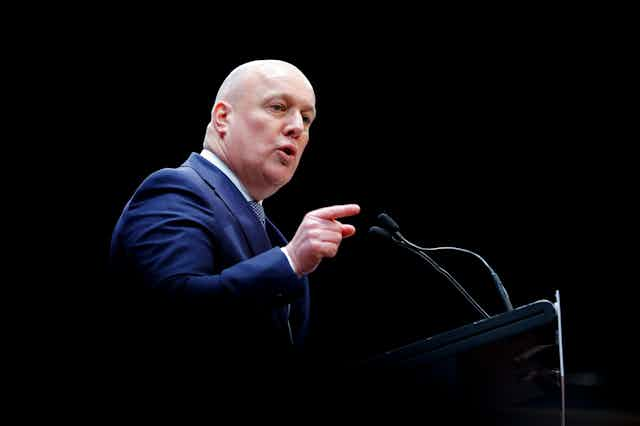The National Party’s newly released tax package makes a clear and politically prudent play for the middle-income vote. Proposing to alleviate the financial pain of this “squeezed middle”, it may be key to determining who forms the next government.
The package attempts to provide some tax relief without fuelling inflation. To pay for the proposed tax cuts, the party would introduce new “revenue measures”. Just what these might cost to set up and administer may be a missing element of the picture.
National has announced four key initiatives as part of its tax plan, with implications for those on middle incomes, as well as those at the top and bottom of the income spread:
• shifting income tax brackets to compensate for inflation
• expanding tax credits to reach more modest income earners
• introducing the “FamilyBoost” childcare tax credit (while ending Labour’s extension of 20 hours’ early childhood education for two-year-olds that was scheduled to start in July 2024)
• increasing Working for Families tax credits for working families (from July 2024).
Relief measures aimed at superannuitants include promising to increase NZ Super annually – although that already happens under the current scheme – and to keep the Winter Energy Payment.
Environmental measures are a mixed bag. The Clean Car Standard or “ute tax” will be abolished, as will the Auckland Regional Fuel Tax. National has also promised not to increase fuel levies in its first term.
The party’s plans for the Emissions Trading Scheme are vague, but polluters will be expected to pay more for the damage they cause in the future. As the tax policy makes clear, short-term concerns about the cost of living trump longer-term considerations about climate change.
Revenue neutral means new taxes
To ensure the package is revenue neutral, four new taxes will be introduced. If the policy is aimed at those who vote, then three of the new taxes are aimed at shifting the tax burden to those who cannot vote.
The Foreign Buyer Tax (FBT) will be levied at a flat rate of 15% on residential properties worth more than NZ$2 million bought by non-residents.
A second stream of revenue will come from a tax on offshore gambling.
And a third will be from cost recovery from immigrants to cover public spending on the immigration system. To be competitive, charges will not exceed 90% of corresponding Australian immigration charges.
The last seems to be least problematic, although questions might be raised about barriers to overseas student entry.
While there are overseas examples of the FBT, National could face logistical hurdles in introducing something similar here. The Vancouver FBT, for example, piggybacks on the state transfer tax (stamp duty) and so there is an existing administrative structure.
It would be interesting to see whether a low-cost new tax can be introduced without existing infrastructure.
The casino tax seems most problematic. According to this new policy, a National government would establish a “regulatory regime” requiring foreign online betting operators to report their New Zealand income. This proposal seems fanciful.
It is also interesting to compare this initiative with the proposal to scrap Labour’s proposed extension of GST to providers of platform-based services, such as Airbnb. Both proposals are aimed at offshore services but Labour’s seems far easier to implement.
Generally, two of the new proposals appear to gloss over the massive IT costs that tend to accompany new taxes. Establishing a new bureaucracy to chase offshore companies also goes against the reduction of the public sector espoused by ACT, National’s likely partner.
The fourth proposal to scrap depreciation for commercial buildings, introduced during the COVID-19 pandemic, is the least National-like initiative. It seems to jar with the reinstatement of favourable tax treatment of rental properties.
Safeguarding the ‘un-squeezed top’
If National’s package is aimed at helping the “squeezed middle”, it is likely to go some way to achieving that goal – and secure votes. What the package does not do is engage with the problem of tax-free wealth.
Just this week the International Monetary Fund once again urged New Zealand to introduce a comprehensive capital gains tax. National’s package favours “the un-squeezed top” by reinstating tax deductions for rental properties, reducing the brightline test to two years, and leaving capital gains untaxed.
Read more: How to read the political polls: 10 things you need to know ahead of the NZ election
And the bottom? National would increase Working for Families tax credits. But as the Child Poverty Action Group have consistently observed, the discrimination against the children of non-working welfare recipients is unjustified and unfair.
Moving the income tax thresholds and extending eligibility for the Independent Earner Tax Credit are welcome. But these will make little difference to the lowest income earners.
Take a single person with no children earning the minimum wage of $22.70 per hour, working 37.5 hours per week ($44,265 a year). They gain around $1.30 a fortnight from the extended Independent Earner Tax Credit, and around $4.30 a fortnight from the income tax threshold movement.
So, roughly $5.60 a fortnight – not enough for a café coffee, let alone that lower priced tank of petrol the National Party policy also promises.
Contrast this with a single person without children who earns $180,000 per year. This person benefits to a greater extent from the movement of the income tax thresholds and gains $40 per fortnight – roughly seven times the gain of someone on minimum wage.
Combined with policies like the removal of the Community Connect public transport subsidies (targeted at young and low-income people) and stopping Fair Pay Agreements, there isn’t a lot here for the least well off. But these are probably not the voters National is after.

